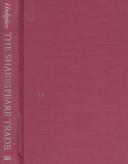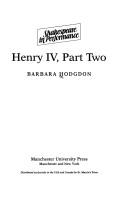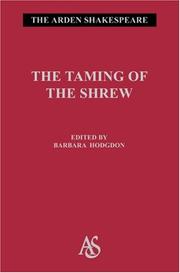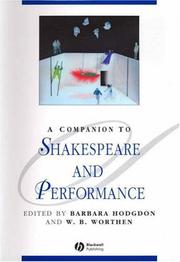| Listing 1 - 10 of 13 | << page >> |
Sort by
|
Book
ISBN: 069106833X 1322019703 9781400861767 1400861764 9780691068336 0691608806 9780691608808 9780691608808 0691637199 Year: 1991 Publisher: Princeton, N.J. Princeton UP
Abstract | Keywords | Export | Availability | Bookmark
 Loading...
Loading...Choose an application
- Reference Manager
- EndNote
- RefWorks (Direct export to RefWorks)
In this bold reconceptualization of Shakespeare's histories as plays that ultimately generate and seek to legitimize new kings, Barbara Hodgdon examines how closure contests as well as celebrates power relations dominant in late Elizabethan and early Jacobean society--particularly those between sovereign and subjects. Taking a broad view of closure as a developing process in which narrative structures, generic signs, and rhetorical conventions play contributory, and often contradictory, roles, she also considers how theatrical representations interpret, or reinterpret, closural features to recuperate and redirect their social energies. By giving special emphasis to theatrical reproduction as a form of textuality and to the intertextual relations between drama and other forms of history writing, Hodgdon situates performance as a type of new historicism and shows how theatrical productions, like critical discourse, participate in cultural work. Through a study of playtexts and selected performance texts, she negotiates between the critical and theatrical guises of Shakespeare to assess how past and present-day theatrical practice has appropriated his work to serve particular institutional and social practices.Originally published in 1991.The Princeton Legacy Library uses the latest print-on-demand technology to again make available previously out-of-print books from the distinguished backlist of Princeton University Press. These editions preserve the original texts of these important books while presenting them in durable paperback and hardcover editions. The goal of the Princeton Legacy Library is to vastly increase access to the rich scholarly heritage found in the thousands of books published by Princeton University Press since its founding in 1905.
Historical drama, English --- Literature and history --- Kings and rulers in literature --- Contradiction in literature --- Closure (Rhetoric) --- English --- Languages & Literatures --- English Literature --- Endings (Rhetoric) --- Last lines (Rhetoric) --- Peroration --- Rhetoric --- History and literature --- History and poetry --- Poetry and history --- History --- English historical drama --- English drama --- History and criticism --- Drama --- English literature --- Shakespeare, William --- Closure (Rhetoric). --- Contradiction in literature. --- Kings and rulers in literature. --- History and criticism. --- Great Britain -- History -- 1066-1687 -- Historiography. --- Historical drama, English -- History and criticism. --- Literature and history -- Great Britain. --- Shakespeare, William, -- 1564-1616 -- Histories. --- Shakespeare, William, --- Histories. --- Great Britain --- Historiography. --- In literature.

ISBN: 0812231430 0812213890 9780812213898 9780812231434 Year: 1998 Publisher: Philadelphia: University of Pennsylvania press,
Abstract | Keywords | Export | Availability | Bookmark
 Loading...
Loading...Choose an application
- Reference Manager
- EndNote
- RefWorks (Direct export to RefWorks)
Capitalism and literature. --- Literature and society --- History. --- Shakespeare, William (1564-1616) --- Littérature et société --- Capitalisme et littérature --- Etats-Unis --- Histoire --- Cinéma adaptations --- Adaptation théâtrale --- Grande-Bretagne --- Stratford --- Shakespeare, William
Book
Year: 2002 Publisher: Washington (D.C.): Folger Shakespeare Library,
Abstract | Keywords | Export | Availability | Bookmark
 Loading...
Loading...Choose an application
- Reference Manager
- EndNote
- RefWorks (Direct export to RefWorks)

ISBN: 0719027519 Year: 1993 Publisher: Manchester Manchester University Press
Abstract | Keywords | Export | Availability | Bookmark
 Loading...
Loading...Choose an application
- Reference Manager
- EndNote
- RefWorks (Direct export to RefWorks)
Book
Year: 1991 Publisher: [Place of publication not identified] Princeton University Press
Abstract | Keywords | Export | Availability | Bookmark
 Loading...
Loading...Choose an application
- Reference Manager
- EndNote
- RefWorks (Direct export to RefWorks)
Historical drama, English --- Literature and history --- Kings and rulers in literature --- Contradiction in literature --- Closure (Rhetoric) --- History and criticism --- Shakespeare, William, --- Histories. --- Great Britain --- History --- Historiography. --- In literature.
Digital
ISBN: 9781400861767 9780691608808 Year: 2014 Publisher: Princeton, N.J. Princeton University Press
Abstract | Keywords | Export | Availability | Bookmark
 Loading...
Loading...Choose an application
- Reference Manager
- EndNote
- RefWorks (Direct export to RefWorks)

ISBN: 9781903436936 9781903436929 1903436931 Year: 2010 Publisher: London: Arden Shakespeare,
Abstract | Keywords | Export | Availability | Bookmark
 Loading...
Loading...Choose an application
- Reference Manager
- EndNote
- RefWorks (Direct export to RefWorks)
The Taming of the Shrew is unique among Shakespeare's plays and is a perennial and compelling success in the theatre. Its reception is marked, however, by ongoing polarised debate over the meaning and worth of the play. This edition disengages Shakespeare's exuberant and disturbing marital farce from the tangled history of its reception. It views the two sixteenth-century Shrew plays as textually independent but theatrically interdependent and so includes the full text of The Taming of A Shrew in an appendix. While the Introduction and Commentary focus on the critical and theatrical debate surrounding the play, the original and comprehensive editing of the playtext makes available a 'different' Shrew, more open to the reader's interpretation than is usually the case. Barbara Hodgdon is a distinguished feminist scholar whose reading of the play offers a stimulating array of ideas and questions about this enduringly popular yet challenging comedy.
Man-woman relationships --- Gender role --- Sex differences (Psychology) --- Social role --- Gender expression --- Sexism --- Female-male relationships --- Male-female relationships --- Men-women relationships --- Relationships, Man-woman --- Woman-man relationships --- Women-men relationships --- Mate selection --- Relations with women --- Relations with men --- Padua (Italy) --- Married people --- Sex role --- Sex (Psychology) --- Married couples --- Married persons --- People, Married --- Persons, Married --- Couples --- Marital status --- Spouses --- Men --- Women --- Interpersonal relations --- English literature --- Padova (Italy) --- Patavium (Italy) --- Patowa (Italy) --- Padowa (Italy) --- Padoue (Italy) --- Padui︠a︡ (Italy) --- Gender roles --- Gendered role --- Gendered roles --- Role, Gender --- Role, Gendered --- Role, Sex --- Roles, Gender --- Roles, Gendered --- Roles, Sex --- Sex roles
Book
ISBN: 0333690982 Year: 1997 Publisher: Boston (Mass.) : Bedford books,
Abstract | Keywords | Export | Availability | Bookmark
 Loading...
Loading...Choose an application
- Reference Manager
- EndNote
- RefWorks (Direct export to RefWorks)
Book
Year: 1974 Publisher: Place of publication unknown University of New Hampshire
Abstract | Keywords | Export | Availability | Bookmark
 Loading...
Loading...Choose an application
- Reference Manager
- EndNote
- RefWorks (Direct export to RefWorks)

ISBN: 1405111046 9781405111041 9781405188210 Year: 2005 Publisher: Malden ; Oxford Blackwell Publishing
Abstract | Keywords | Export | Availability | Bookmark
 Loading...
Loading...Choose an application
- Reference Manager
- EndNote
- RefWorks (Direct export to RefWorks)
Theatrical science --- Shakespeare, William --- Shakespeare, William, --- Dramatic production. --- Film and video adaptations. --- Dramatic production --- Film and video adaptations --- Handbooks, manuals, etc.
| Listing 1 - 10 of 13 | << page >> |
Sort by
|

 Search
Search Feedback
Feedback About UniCat
About UniCat  Help
Help News
News